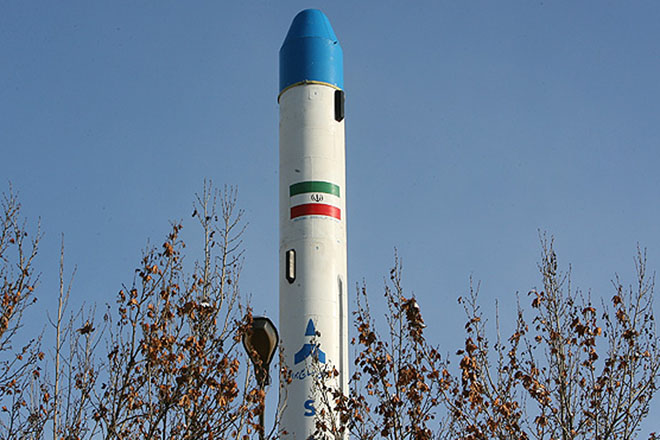Baku, Azerbaijan, Oct. 15
By Umid Niayesh - Trend:
Iran's ballistic missiles pose far less of a threat if its nuclear program is restricted and Tehran cannot pursue nuclear weapons, Kelsey Davenport, the Director for Nonproliferation Policy at the Arms Control Association told Trend Oct. 15.
Davenport was commenting on the disputes over Iran's recent ballistic missile test, which took place Oct. 11. Tehran's test-firing its new long-range ballistic missile Emad triggered a reaction from the West.
In particular, the US Department of State said it would refer the issue to the United Nations Security Council for review to determine whether the test violated the UN Security Council resolution 1929.
Davenport believes that the missile test clearly violates the resolution which is still in effect.
The provisions of UN Security Council Resolution 1929 are not terminated until the International Atomic Energy Agency certifies that Iran has taken key steps under the nuclear deal to limit its nuclear program and allow inspectors greater access, the expert said, adding Iran will begin taking those steps next week, after the agreement is formally adopted on Oct. 18.
"After that, it could take Tehran anywhere from 2-6 months to complete its tasks. At that point the restrictions from Resolution 1929 are replaced by those outlined in Resolution 2231."
The Resolution 1929, prohibits Iran from testing and developing ballistic missiles capable of delivering nuclear weapons, however, Iran has never considered itself bound by Resolution 1929, because it considers the UN sanctions illegal and based on false allegations regarding its nuclear program, she underlined.
Davenport further said that since 2010, when the resolution as passed, Iran has tested ballistic missiles on multiple occasions in defiance of the resolution.
She added that because Resolution 2231 is not in force, Iran is not violating it. However, Tehran's actions are unhelpful and certainly defy the spirit of the resolution.
The text of the new resolution also says that Iran is "called upon to comply" with a prohibition on testing or developing ballistic missiles capable of delivering a nuclear weapons, she noted.
"That could leave space for Iran to argue that its ballistic missiles are for conventional purposes, even though the missile Tehran tested meets the minimum requirements for delivering a nuclear weapons (500 kilogram payload over 300 kilometers)."
She further commented on Iranian officials' statements that the test firing of missiles by Iran does not breach the country's obligations to the JCPOA.
"The JCPOA does not place restrictions on Iran's ballistic missile program. The UN Security Council Resolution 2231 calls up on Iran not to test ballistic missiles designed to be capable of delivering a nuclear warhead," Davenport explained.
While commenting on Iranian side's claim that parts of the UNSC resolution regarding Iran's missile program is non-binding, the expert said that the UN Security Council resolutions are binding on all member states, and Iran voluntarily entered into the agreement that Resolution 2231 endorses.
"However, Resolution 2231 is not yet fully in effect. While Iran's decision to test a missile at this delicate stage is unhelpful, critics of the agreement should not use it as an excuse to walk away from the agreement."
Davenport further rejected a possible secret agreement between Tehran and Washington, permitting Iran to continue its missile program.
"It is highly unlikely that there is a secret agreement allowing Tehran to continue testing its ballistic missiles - that defies the spirit of the UN resolution."
Responding a question about possible measures which may be taken by US if Iran continues to violate the UN resolutions, she said that the United States has a number of options at its disposal if Iran violates its commitments, ranging from re-imposition of the US sanctions to going to the UN Security Council to snap UN sanctions back into place.
However, Washington should think carefully about the steps it chooses and ensure that it does not kill the deal over a technical error, or a violation, such as a missile test, that has no bearing on Iran's commitments to restrict its nuclear program under the deal, Davenport underlined.
"That being said, Iran cannot flout its obligations under the nuclear agreement and Resolution 2231. If these events occur in the future, after the deal is implemented, Washington should consider a measured response that targets the missile activity while seeking to keep the core of the nuclear deal in place."






